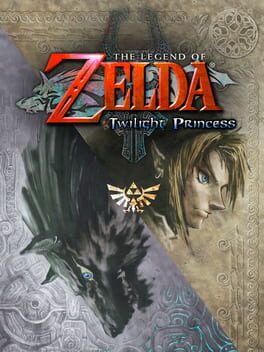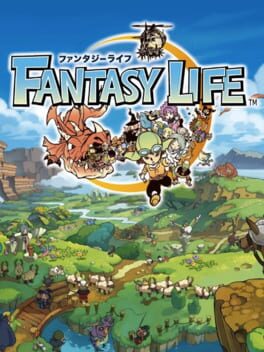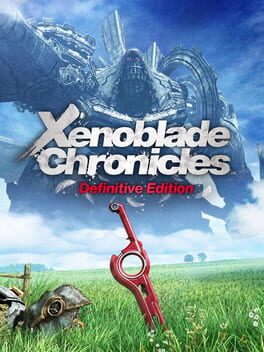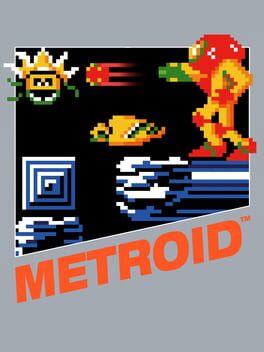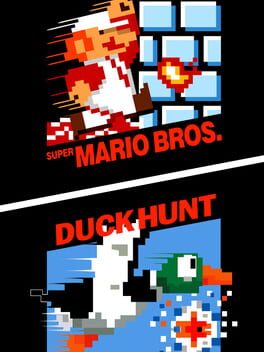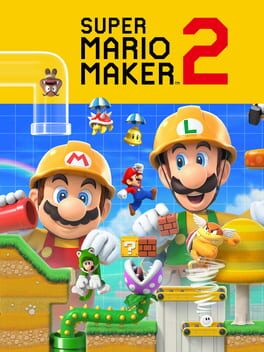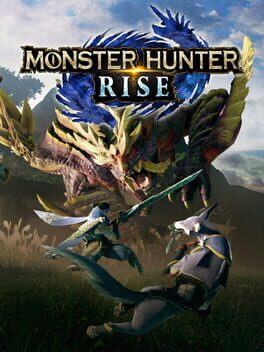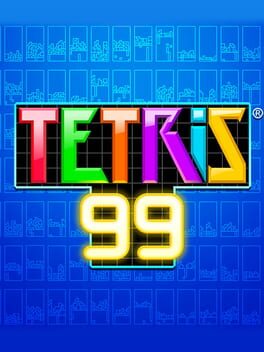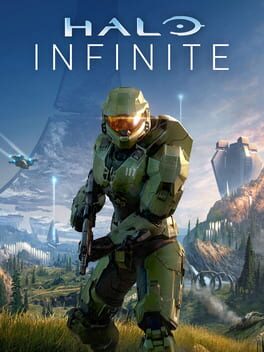Gerborious
77 reviews liked by Gerborious
While somewhat frustrating at times TotK builds on everything thing that made BOTW great and tries to improve on the weaker aspects too.
The story is the main event here for me, it all builds to the most satisfying conclusion since Twilight Princess.
The story is the main event here for me, it all builds to the most satisfying conclusion since Twilight Princess.
This review contains spoilers
Twilight Princess is the Zelda game I want the MOST to love. Its not without its flaws, but by the time you deliver the final blow to Ganondorf, it doesn't really matter. This game is so huge in scope and brimming with adventure. I could sit here and complain about its flaws, its obsession with series tradition and lack of originality, the rather poor structure and meaningless padding. But I wont. Because at the end of the day this is still the freaking Legend of Zelda. This may not be my favorite Zelda but that's okay, I know how special it is to so many people. Nintendo has a knack for creating games and experiences that stick with you forever. Midna saying goodbye will always be one of the most bittersweet moments in any video game. Stuff like that is what makes this game worth playing. Yes the dungeons and puzzles are fun as well as the combat and exploration, but really to me what sticks out most about this game is Midna and her journey.
Not sure when I will revisit Twilight Princess. It sits in a strange place in a post BOTW world. When I played the HD version in 2020 it felt great to just dive back into a more traditional linear Zelda, and again here with Tears of the Kingdom around the corner. This game will always be here for me when I want a more classic Zelda experience, even tho I hope Nintendo will go back to this style in the next installment 6 or 7 years down the line. This series carries so much weight in name alone and means so much to me, it would be a shame to never go back to what made me love it in the first place.
PS: FUCK that Canoe mini-game it took me like 20 tries to finally get the upgraded bomb-bag. Oh well.
Not sure when I will revisit Twilight Princess. It sits in a strange place in a post BOTW world. When I played the HD version in 2020 it felt great to just dive back into a more traditional linear Zelda, and again here with Tears of the Kingdom around the corner. This game will always be here for me when I want a more classic Zelda experience, even tho I hope Nintendo will go back to this style in the next installment 6 or 7 years down the line. This series carries so much weight in name alone and means so much to me, it would be a shame to never go back to what made me love it in the first place.
PS: FUCK that Canoe mini-game it took me like 20 tries to finally get the upgraded bomb-bag. Oh well.
A whole lot can be said about Breath of the Wild. It is rather fitting that its' "ending" feels so anti-climactic. Because once you have beaten all 4 Divine Beasts, gotten near max stamina and hearts the final fight is a push over. Not to mention I just did Twilight Princess' final showdown and that makes this one feel even less cool. All this being said is to say Breath of the Wild isn't about its story and main conflict. As much as I wish it was a very focused story driven experience it is not. It is all about the figurative Breath of the Wild.
Since this game's release in 2017 the main things I remember about it are my own memories and experiences, not the hand made set pieces created by the developers. I think this says alot about this game and the beauty of it. It may lack what I really want to see in a Zelda game but I cannot deny the fact that I really have enjoyed my time with this title since release.
I am very curious for what TotK will bring to the table both game-play and story wise, its only a few short hours away....
Since this game's release in 2017 the main things I remember about it are my own memories and experiences, not the hand made set pieces created by the developers. I think this says alot about this game and the beauty of it. It may lack what I really want to see in a Zelda game but I cannot deny the fact that I really have enjoyed my time with this title since release.
I am very curious for what TotK will bring to the table both game-play and story wise, its only a few short hours away....
Resident Evil 4
2023
Super solid remake, with great presentation and design. However I never felt like the game-play clicked with me, even at the end the experience felt clunky and frustrating to me. The action game play is great but it just never felt smooth. Especially compared to the RE2 and 3 Remakes. I liked the extra exploration that was similar to RE8. Memorable set-pieces through and through and great story moments. Leon is best boy.
Fantasy Life
2012
if you havent played fantasy life im gonna kill the fuck out of you
Fantasy Life
2012
i've played through this game, start-to-finish (dlc included), twice. 100% the second time. i'm pretty sure i could do it again and want to do it again and the only thing stopping me is a quiet voice of reason saying "those 200 hours would be better spent on something else".
fantasy life is... a lot of things, all of them good. its story is aimed at kids and is so warm and hopeful in a way that's kind of contagiously wholesome. the graphics are cute and bubbly in the same manner. uematsu brings his a-game and gets really creative with the music in a way that i found surprisingly memorable and unique. the game mechanics are all relatively simple but give you enough to do that you never feel bored.
in a way, the game feels a little bit like an mmo (more specifically, a lot of its gameplay elements remind me of final fantasy xiv), but without the sense of crowded loneliness that often entails. you just have a lot of options on what you can choose to do or not do, and it really helps feel like you get to pick the experience you want to get out of the game. the option for multiplayer makes it really easy to not feel too hung-up over having to cover all the classes on your own, too.
i love games with crafting, and i loved how gathering and crafting in this game feel like mechanics and not just thoughtlessly added menus. the minigames are hectic, gathering essentially has non-battle bosses, and any of those classes could just go ahead and run through the whole plot if they wanted.
i'm not even sure where i'm going with things anymore, but i love this game and everything about it cheers me up and feels fun and comfy and i only wish there was even more of it.
fantasy life is... a lot of things, all of them good. its story is aimed at kids and is so warm and hopeful in a way that's kind of contagiously wholesome. the graphics are cute and bubbly in the same manner. uematsu brings his a-game and gets really creative with the music in a way that i found surprisingly memorable and unique. the game mechanics are all relatively simple but give you enough to do that you never feel bored.
in a way, the game feels a little bit like an mmo (more specifically, a lot of its gameplay elements remind me of final fantasy xiv), but without the sense of crowded loneliness that often entails. you just have a lot of options on what you can choose to do or not do, and it really helps feel like you get to pick the experience you want to get out of the game. the option for multiplayer makes it really easy to not feel too hung-up over having to cover all the classes on your own, too.
i love games with crafting, and i loved how gathering and crafting in this game feel like mechanics and not just thoughtlessly added menus. the minigames are hectic, gathering essentially has non-battle bosses, and any of those classes could just go ahead and run through the whole plot if they wanted.
i'm not even sure where i'm going with things anymore, but i love this game and everything about it cheers me up and feels fun and comfy and i only wish there was even more of it.
Fantasy Life
2012
When I was younger and more prone to spending time online playing free MMOs, the ones that fascinated me the most were the ones that allowed me to do something other than fighting monsters. It's not that I didn't like the fighting, nor that I didn’t know any games without combat, it’s just that being in a fantasy world as something other than a warrior felt so special. It wasn't until 2013's Fantasy Life, however, that someone made a game to cater specifically to that taste.
Fantasy Life is an action RPG, and its premise is simple: You're a citizen of Castele, a kingdom in the magical land of Reveria, and time has come for you to choose your Life -- that is, your job. There are twelve Lifes to choose from, four of which are fighters (Paladin, Mercenary, Hunter and Magician) and eight of which are not (Miner, Angler, Woodcutter, Carpenter, Blacksmith, Alchemist, Cook and Tailor).
While Lives might sound like a fixed character class, it is but a transitory state: once you've gotten your license for your first Life -- essentially a tutorial -- and progressed a bit through the game, you're free to go back and get a license for another Life and swap between them whenever. And that's the beauty of the world of Fantasy Life: it's filled with quests and opportunities for every Life, and your approach to locations changes depending on which class you are currently.
More than that, while you can, theoretically, pick a Life and play through the entire game on it, the game actively discourages that sort of approach, instead making it so the work of a class is crucial for the success of another. A Blacksmith needs raw ore and wooden beams, the latter of which a Carpenter has to create from logs, but they, in turn, need fabric to fashion some of their furniture, which a Tailor can provide. Fighter classes can provide rare materials they collect from monsters, and benefit from improved gear that crafters can create.
Each Life has a rank, starting from Novice and moving all the way up to Legend. To increase one's rank, class-specific quests must be completed: Craft said item, kill said monsters, recover the wood from a special tree, find a specific mineral, and so on. These lists of quests are refreshed every time you move up a rank, and have you adventuring all over Reveria to get them done.
Reveria is an excellently realized game world. Some players call Fantasy Life "a single player MMO", which in some ways, it is, but crucially, it avoids the common trap amongst games with that tagline where the world is made large, sparse, and boring. Reveria is instead densely packed, filled with interesting places to visit, loot to collect and boons to find. The game rewards exploring on your own, as there's many locations the story alone will not show you through but that will benefit specific Lives.
Speaking of which, I love the story in Fantasy Life. It starts off a bit clichéd, as an unassuming adventurer fresh from obtaining their first Life license -- that's you -- gets dragged into an adventure which will have them meeting god and preventing the destruction of the world. However, it's that stellar kind of E-rated writing that makes you feel like the main character in a saturday morning cartoon, going on a grand adventure where you make friends and help people in need.
The game features a wide cast of lovable characters, each of which has a distinct personality and their own twists. This then feeds into the stakes of the narrative: it's easy, in games with grimdark and moody settings, to lose sight of your goals, of what your character is meant to be fighting for. Fantasy Life makes sure to show you how much good there is in Reveria before it shows the threat looming above it: it looks childish and is often very playful, but it's also really good at creating drama and tension when needed.
The quality of the main story was a nice surprise: I wasn't expecting that when I first started playing, but once it got going, it was one of the rare instances where I temporarily put aside all the side content in a game until I finished the main story, just to see how it would end. Another surprise was the excellent soundtrack, which was composed by Nobuo Uematsu, and it shows. The background music is phenomenal, and there are some vocal songs that play on special occasions that are a treat.
Fantasy Life is a truly remarkable experience: it stands as my favorite 3DS game, and it's criminal that, nearly ten years later, the closest thing we got for a sequel was a lousy mobile game. Should you choose to visit Reveria, be it brandishing a sword versus a giant dragon, swinging your hammer against the anvil, reeling in a fish or making a delicious omelet, your time is sure to be exciting.
Fantasy Life is an action RPG, and its premise is simple: You're a citizen of Castele, a kingdom in the magical land of Reveria, and time has come for you to choose your Life -- that is, your job. There are twelve Lifes to choose from, four of which are fighters (Paladin, Mercenary, Hunter and Magician) and eight of which are not (Miner, Angler, Woodcutter, Carpenter, Blacksmith, Alchemist, Cook and Tailor).
While Lives might sound like a fixed character class, it is but a transitory state: once you've gotten your license for your first Life -- essentially a tutorial -- and progressed a bit through the game, you're free to go back and get a license for another Life and swap between them whenever. And that's the beauty of the world of Fantasy Life: it's filled with quests and opportunities for every Life, and your approach to locations changes depending on which class you are currently.
More than that, while you can, theoretically, pick a Life and play through the entire game on it, the game actively discourages that sort of approach, instead making it so the work of a class is crucial for the success of another. A Blacksmith needs raw ore and wooden beams, the latter of which a Carpenter has to create from logs, but they, in turn, need fabric to fashion some of their furniture, which a Tailor can provide. Fighter classes can provide rare materials they collect from monsters, and benefit from improved gear that crafters can create.
Each Life has a rank, starting from Novice and moving all the way up to Legend. To increase one's rank, class-specific quests must be completed: Craft said item, kill said monsters, recover the wood from a special tree, find a specific mineral, and so on. These lists of quests are refreshed every time you move up a rank, and have you adventuring all over Reveria to get them done.
Reveria is an excellently realized game world. Some players call Fantasy Life "a single player MMO", which in some ways, it is, but crucially, it avoids the common trap amongst games with that tagline where the world is made large, sparse, and boring. Reveria is instead densely packed, filled with interesting places to visit, loot to collect and boons to find. The game rewards exploring on your own, as there's many locations the story alone will not show you through but that will benefit specific Lives.
Speaking of which, I love the story in Fantasy Life. It starts off a bit clichéd, as an unassuming adventurer fresh from obtaining their first Life license -- that's you -- gets dragged into an adventure which will have them meeting god and preventing the destruction of the world. However, it's that stellar kind of E-rated writing that makes you feel like the main character in a saturday morning cartoon, going on a grand adventure where you make friends and help people in need.
The game features a wide cast of lovable characters, each of which has a distinct personality and their own twists. This then feeds into the stakes of the narrative: it's easy, in games with grimdark and moody settings, to lose sight of your goals, of what your character is meant to be fighting for. Fantasy Life makes sure to show you how much good there is in Reveria before it shows the threat looming above it: it looks childish and is often very playful, but it's also really good at creating drama and tension when needed.
The quality of the main story was a nice surprise: I wasn't expecting that when I first started playing, but once it got going, it was one of the rare instances where I temporarily put aside all the side content in a game until I finished the main story, just to see how it would end. Another surprise was the excellent soundtrack, which was composed by Nobuo Uematsu, and it shows. The background music is phenomenal, and there are some vocal songs that play on special occasions that are a treat.
Fantasy Life is a truly remarkable experience: it stands as my favorite 3DS game, and it's criminal that, nearly ten years later, the closest thing we got for a sequel was a lousy mobile game. Should you choose to visit Reveria, be it brandishing a sword versus a giant dragon, swinging your hammer against the anvil, reeling in a fish or making a delicious omelet, your time is sure to be exciting.
This review contains spoilers
We are only Gods of Ourselves.
Xenoblade Chronicles is a lot of things. A passion project; a bloated bore; a good game. The amount of time, care and love put into this piece is apparent, and exactly why this game is seen through to the end, despite its own attempts to prevent the player from doing so.
The Bionis, and the Mechonis; All there is, all there was. The concept of living atop giants, absurd as it is, is fully realized. We come to understand the world as it is; a living being, with flesh and blood; antibodies and parasites. A true living world. The sheer scope, what it means to live upon a giant, is purposefully obfuscated at first. As the player travels up the Bionis alongside Shulk, they experience the various climates, cultures, and people inhabiting the body. A snowy peak on the head, a town plagued by falling debris on the resting calve. The world is fully realized and understood, and is by far the strongest aspect of the game.
The world of Xenoblade however, is not enjoyable to explore in and of itself. Exploration in game is marred by the slow movement speed of the party, and the large, expansive, empty lands you travel. You are never truly incentivized to travel, explore, to visit every crack, crease, and crevice. Sidequests will ask you to travel to a pond, kill some fish, without any compelling reason as to why you should do so. There’s a sense of aimlessness to it all, akin to wasting time, as if you’re procrastinating the main story. There is no natural reward for exploration, all you find off the beaten path is more monsters to fight, and the occasional ether mine. The monsters are rarely anything more interesting than what you’ve already been fighting, and the ether mines only serve as a method to further bloat the gameplay systems.
Ether mines are used to obtain ether gems, which insert into equipment to allow for additional effects in combat. An interesting mechanic encouraging unique builds, but the execution leaves much to be desired. There is rarely any easy way to obtain the gems you want, so it is often up to chance as to if you will have the gems you actually want. Gem crafting is the easiest way to obtain these enhancers, but it's a slow, tedious, and unengaging process. Your inventory quickly fills with items for gem crafting, but you will never be excited for the process, as your inventory will be so full you won’t know where to begin. This bloat defines the regular equipment system as well. Your inventory will so often be filled with assorted equipment, with the most minute of differences, with no easy method to sort or dispose of useless gear. Gear is sorted into various categories and types, making sorting them and finding what you want even more of a bore. The equipment management feels is a hassle, discouraging you from actually changing things up and experimenting like the game intends for you to.
The game begs you to experiment, but the mechanics constantly discourage you from doing so. The affection and skill link system encourage using various groupings of party members to raise their affections and unlock skill links, but the game often expects you to have Shulk in the party, as he hosts various unique skills. Not having Shulk in your party is a death sentence against various enemy types, so your party building is unfortunately limited. The lack of control over the AI beyond a rudimentary tactics system results in your party members often not doing what you’d like them to. This discourages you from ever even controlling other party members beyond Shulk, for the AI is not capable of making the proper strategic situations required of his role. This further cements Shulk as the only character you should control. Swapping party members out is made a hassle, the lack of a load-out system results in the player having to re-select their skill links, swap out their arts, change their equipment, gems, etc, until they fit properly within the new party. This bloat and tedium requires a lot of patience from the player, and is not appreciated in a game that is already so long as is.
This bloat extends to the narrative as well. While the game starts off strong after the Mechon attack, it starts to flounder soon after. It never becomes a bad story, but it spends too long stumbling around in areas that end up being meaningless in the grand scheme of things. Many areas serve as nothing more than highways to the next story location, with nothing of interest beyond the visuals and atmosphere of the areas themselves. Many locations could be cut from the game as a whole and there wouldn’t be any major loss. The story picks up once you reach the Fallen Arm, but everything before then is a peak or valley of quality and pacing. The fight with Xord is exciting and piques your interest, but much of the story between then and arriving at Alcamoth feels somewhat meandering. This sense of aimlessness can extend to the central cast as well. While Shulk is a well rounded central figure, many characters feel like they don’t have much to offer. Reyn, Dunban, and Melia all bounce off Shulk very well, their relationships real and believable. Riki and Fiora are both fun, but they definitely lack a sense of depth that makes the rest of the cast interesting. Sharla bares the worst of this aimlessness however. She doesn’t have much importance in the plot, primarily serving as a vehicle for Reyn’s character development. Beyond that, all she has for personality is her relationship to her fiance. She is entirely dependent on these male figures for her character, and it’s disappointing to see that she could be entirely written out of the story with relatively minor changes.
The biggest flaw of the narrative however, is the writer’s excitement to tell it. Foreshadowing is an important technique in stories, and can serve to make narratives more interesting to experience on repeat. When the foreshadowing actively spoils the narrative however, it instead serves to make the first experience worse. Numerous scenes in the story feature characters making incredibly obvious allusions to future narrative beats, the most egregious of which is Dickson’s betrayal. Dickson is shown throughout the game to know more than the average Homs, to an absurd degree, and that is perfectly fine. It makes him a character you have many questions about; as to how he knows so much about the Bionis, all the people living on it, and so on. The issue however, comes in when he is often shown to be planning behind your back. Constant scenes of him turning away from the cast and saying “The plan is all falling into place,” give the player the idea that he is suspicious and not to be trusted, not naturally, through their own wit and intuition, but unnaturally, through him saying things that obviously incriminate him as a suspicious individual. It showcases a lack of respect for the viewer to be able to pick up on character traits themselves. It makes any future events involving that character less surprising, less exciting, and less impactful. Dickson betraying the party could have been an unexpected and exciting part of the narrative, but it is instead expecting, awaited, and uninteresting. There are still good twists, but much of the game is brought down by this failure.
This doesn’t make the narrative unenjoyable however, and the message of the story within is still poignant. What starts off as a simple revenge tale, is denied at the last minute. Shulk forgoes revenge once he learns what is truly happening. He breaks the cycle of revenge, and denies his own destiny. He is not the one to choose who lives and dies, and neither should anyone else. He controls his own fate, and the fate of others should lie with others. He denies Zanza, believing that a God should not be free to control the fate of others unimpeded. He decides to fight against the concept of fate itself, because nobody should have control over the fates of others. Defeating Zanza has Shulk choose to deny the path laid out for him, and the path laid out for all life. We are not born to die, we are born to live. Denying the path of godhood, he wishes for a world with no gods. We are the ones who will carve our paths forward, and we are the ones in control of our destiny. Only Gods of ourselves. No greater power has control over us.
The gameplay cycle of Xenoblade is a mess. There are so many minor flaws that build up to bring down the overall experience. But despite that all, it is clearly a labour of love. A world created from the ground up, wholly unique and unlike any other. A story about hope and optimism, encouraging players to cease their own destiny. Characters that fight through it all for the hope of a better tomorrow. It is a story worth experiencing despite its flaws, and a game that deserves recognition for what it achieves. It is a beautiful mess of an experience.
Xenoblade Chronicles is a lot of things. A passion project; a bloated bore; a good game. The amount of time, care and love put into this piece is apparent, and exactly why this game is seen through to the end, despite its own attempts to prevent the player from doing so.
The Bionis, and the Mechonis; All there is, all there was. The concept of living atop giants, absurd as it is, is fully realized. We come to understand the world as it is; a living being, with flesh and blood; antibodies and parasites. A true living world. The sheer scope, what it means to live upon a giant, is purposefully obfuscated at first. As the player travels up the Bionis alongside Shulk, they experience the various climates, cultures, and people inhabiting the body. A snowy peak on the head, a town plagued by falling debris on the resting calve. The world is fully realized and understood, and is by far the strongest aspect of the game.
The world of Xenoblade however, is not enjoyable to explore in and of itself. Exploration in game is marred by the slow movement speed of the party, and the large, expansive, empty lands you travel. You are never truly incentivized to travel, explore, to visit every crack, crease, and crevice. Sidequests will ask you to travel to a pond, kill some fish, without any compelling reason as to why you should do so. There’s a sense of aimlessness to it all, akin to wasting time, as if you’re procrastinating the main story. There is no natural reward for exploration, all you find off the beaten path is more monsters to fight, and the occasional ether mine. The monsters are rarely anything more interesting than what you’ve already been fighting, and the ether mines only serve as a method to further bloat the gameplay systems.
Ether mines are used to obtain ether gems, which insert into equipment to allow for additional effects in combat. An interesting mechanic encouraging unique builds, but the execution leaves much to be desired. There is rarely any easy way to obtain the gems you want, so it is often up to chance as to if you will have the gems you actually want. Gem crafting is the easiest way to obtain these enhancers, but it's a slow, tedious, and unengaging process. Your inventory quickly fills with items for gem crafting, but you will never be excited for the process, as your inventory will be so full you won’t know where to begin. This bloat defines the regular equipment system as well. Your inventory will so often be filled with assorted equipment, with the most minute of differences, with no easy method to sort or dispose of useless gear. Gear is sorted into various categories and types, making sorting them and finding what you want even more of a bore. The equipment management feels is a hassle, discouraging you from actually changing things up and experimenting like the game intends for you to.
The game begs you to experiment, but the mechanics constantly discourage you from doing so. The affection and skill link system encourage using various groupings of party members to raise their affections and unlock skill links, but the game often expects you to have Shulk in the party, as he hosts various unique skills. Not having Shulk in your party is a death sentence against various enemy types, so your party building is unfortunately limited. The lack of control over the AI beyond a rudimentary tactics system results in your party members often not doing what you’d like them to. This discourages you from ever even controlling other party members beyond Shulk, for the AI is not capable of making the proper strategic situations required of his role. This further cements Shulk as the only character you should control. Swapping party members out is made a hassle, the lack of a load-out system results in the player having to re-select their skill links, swap out their arts, change their equipment, gems, etc, until they fit properly within the new party. This bloat and tedium requires a lot of patience from the player, and is not appreciated in a game that is already so long as is.
This bloat extends to the narrative as well. While the game starts off strong after the Mechon attack, it starts to flounder soon after. It never becomes a bad story, but it spends too long stumbling around in areas that end up being meaningless in the grand scheme of things. Many areas serve as nothing more than highways to the next story location, with nothing of interest beyond the visuals and atmosphere of the areas themselves. Many locations could be cut from the game as a whole and there wouldn’t be any major loss. The story picks up once you reach the Fallen Arm, but everything before then is a peak or valley of quality and pacing. The fight with Xord is exciting and piques your interest, but much of the story between then and arriving at Alcamoth feels somewhat meandering. This sense of aimlessness can extend to the central cast as well. While Shulk is a well rounded central figure, many characters feel like they don’t have much to offer. Reyn, Dunban, and Melia all bounce off Shulk very well, their relationships real and believable. Riki and Fiora are both fun, but they definitely lack a sense of depth that makes the rest of the cast interesting. Sharla bares the worst of this aimlessness however. She doesn’t have much importance in the plot, primarily serving as a vehicle for Reyn’s character development. Beyond that, all she has for personality is her relationship to her fiance. She is entirely dependent on these male figures for her character, and it’s disappointing to see that she could be entirely written out of the story with relatively minor changes.
The biggest flaw of the narrative however, is the writer’s excitement to tell it. Foreshadowing is an important technique in stories, and can serve to make narratives more interesting to experience on repeat. When the foreshadowing actively spoils the narrative however, it instead serves to make the first experience worse. Numerous scenes in the story feature characters making incredibly obvious allusions to future narrative beats, the most egregious of which is Dickson’s betrayal. Dickson is shown throughout the game to know more than the average Homs, to an absurd degree, and that is perfectly fine. It makes him a character you have many questions about; as to how he knows so much about the Bionis, all the people living on it, and so on. The issue however, comes in when he is often shown to be planning behind your back. Constant scenes of him turning away from the cast and saying “The plan is all falling into place,” give the player the idea that he is suspicious and not to be trusted, not naturally, through their own wit and intuition, but unnaturally, through him saying things that obviously incriminate him as a suspicious individual. It showcases a lack of respect for the viewer to be able to pick up on character traits themselves. It makes any future events involving that character less surprising, less exciting, and less impactful. Dickson betraying the party could have been an unexpected and exciting part of the narrative, but it is instead expecting, awaited, and uninteresting. There are still good twists, but much of the game is brought down by this failure.
This doesn’t make the narrative unenjoyable however, and the message of the story within is still poignant. What starts off as a simple revenge tale, is denied at the last minute. Shulk forgoes revenge once he learns what is truly happening. He breaks the cycle of revenge, and denies his own destiny. He is not the one to choose who lives and dies, and neither should anyone else. He controls his own fate, and the fate of others should lie with others. He denies Zanza, believing that a God should not be free to control the fate of others unimpeded. He decides to fight against the concept of fate itself, because nobody should have control over the fates of others. Defeating Zanza has Shulk choose to deny the path laid out for him, and the path laid out for all life. We are not born to die, we are born to live. Denying the path of godhood, he wishes for a world with no gods. We are the ones who will carve our paths forward, and we are the ones in control of our destiny. Only Gods of ourselves. No greater power has control over us.
The gameplay cycle of Xenoblade is a mess. There are so many minor flaws that build up to bring down the overall experience. But despite that all, it is clearly a labour of love. A world created from the ground up, wholly unique and unlike any other. A story about hope and optimism, encouraging players to cease their own destiny. Characters that fight through it all for the hope of a better tomorrow. It is a story worth experiencing despite its flaws, and a game that deserves recognition for what it achieves. It is a beautiful mess of an experience.
Metroid
1986
I am honestly really fond of this game, it hasn't aged the best but looking to how games used to be back then its incredible to play with that mindset.
Mario 1 is good duck hunt is meh

